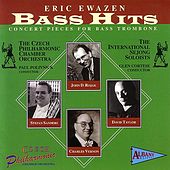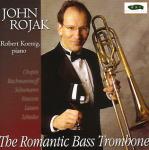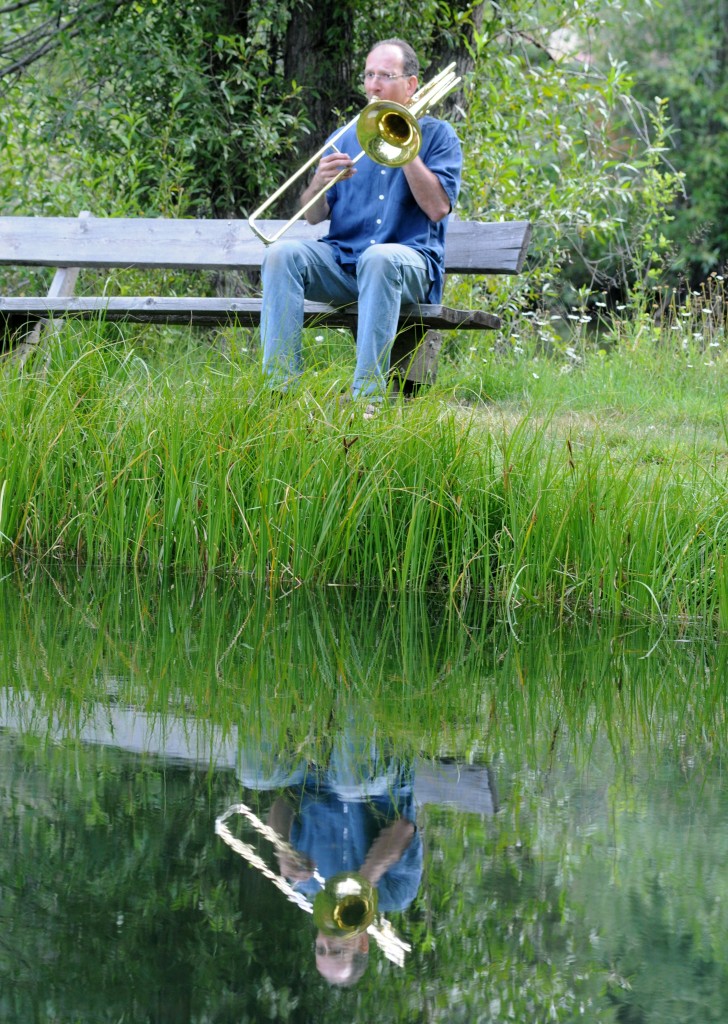In the spring of 2000 Rojak made his New York concerto debut, performing Walter Ross’ Trombone Concerto No. 2 in Alice Tully Hall with the New York Chamber Symphony conducted by Gerard Shwarz. He has served as solo trombone of Solisti NY and performed Ewazen’s Concerto with the Daejon, Korea Philharmonic. As an Accomplished symphonic musician, Rojak is a member of the Orchestra of St. Luke’s and was hand-picked by Gunther Schuller to record Brahms’ First and Beethoven’s Fifth Symphonies for a collaborative CD to accompany Schuller’s book “The Compleat Conductor.†Rojak’s occasional performances include the Cleveland Orchestra, the Los Angeles Philharmonic, the Boston Symphony,and performances for Pope John Paul II.
Mr. Rojak’s talent has flourished at all of the artistic intersections of New York. In addition to chamber and solo recordings, his resume includes a sixteen-year-run of “Les Miserables” and beams with an array of Broadway, jazz, pop and chamber music treasures. Rojak received a Bachelor of Music degree from Juilliard and held fellowships at the Tanglewood and Waterloo Music Festivals. He is on the faculties of Juilliard, Aspen Music Festival and School and serves as the Chair of Brass at the Steinhardt School of New York University (NYU). We at davidbrubeck.com are honored to have John Rojak as the second respondent for year two of “Seven Positions”.
1st Position
What do you look for in an instrument?
I played a Bach 50B2 with a yellow brass bell and a Minick open wrap dependent valve section for 32 years. It was a middle of the road instrument that allowed me to play any type of music that came up in a freelance career. When I switched to my Rath R9 I spent 3 days in their factory in northern England. I tried every part in the shop, first going back frequently to the Bach, then finessing the Rath. When I finished and everyone listening was satisfied, I found out I had built almost a stock horn with a yellow brass bell, regular weight slide, dependent valve section, stock leadpipe–a middle of the road instrument that lets me play any type of music. That must be what I look for!
2nd Position
How do you conceive of describe, or visualize an ideal tone quality?
I think a beautiful sound consists of great core surrounded by an aura of harmonics. I like to think of a rich, full, singing sound that can have a variety of colors.
3rd Position
What is your secret to a beautiful legato?
I practice with no tongue, trying to eliminate as much of the gliss as possible. Then I play the same music adding as little tongue as possible to clear up any remaining smears.
4th Position
What helps you achieve musical expression?
Technical proficiency, then I think of singing.
5th Position
Name two inspirations. One musical and one non-musical.
Musical inspirations come from so many places. I admire all musicians who play with integrity and passion. One of my teachers, John Coffey, helped enable me to not have a limited musical world.
Non-musical inspirations also come from all over: hiking in the Rockies; athletes who transcend their sport and become artists; artists who move me.
6th Position-JR
What are the advantages of bass trombone in a brass quintet? Any disadvantages?
Bass trombone is easier to blend in a quintet, particularly for Renaissance music. Whenever ABQ commissions a piece, I implore the composer to write for a bass voice rather than specifically for a trombone or tuba.
I don’t feel like there are disadvantages to bass trombone in a quintet. I think a skilled player on either bass trombone or tuba can accomplish the same musical goals.
7th Position JR
How has your approach to chamber music changed over the course of your professional career?
I don’t think my approach has changed over the years. I’ve always felt that when you have more than one player, all music is chamber music up to the largest orchestra or band. It’s crucial to have big ears and a selfless approach to music. One of my goals is to serve the music better in whatever way I can.
T1
Best trombone playing you’ve ever heard?
I have been very fortunate to have been in close proximity to a lot of incredible trombone playing. So many of the professionals I’ve heard have been amazing and inspiring that I wouldn’t try to single out even a few of them. Occasionally, one of my students will improve in a way that is more gratifying than the best playing I’ve heard!
T2
 Best trombone playing you’ve ever done?
Best trombone playing you’ve ever done?
That’s not really for me to say! However, I was pretty happy with the recordings of Nixon in China, the Broadway cast album of Romance, Romance, and some of my brass quintet playing. Maybe the biggest relief for me was as a ringer for the Moscow Virtuosi. I was given a part for a Schnittke piece that was pretty challenging with range from pedal Db to high D. I assumed it was all ensemble playing so I learned the notes and was ready to fit in with their brass section at my one rehearsal. When I got to the rehearsal, all the wind players packed up their instruments at the break and I was left alone with the string players and tympani! Turns out, all those notes were basically a concerto. I had to rethink my interpretation and perform it the next day in Avery Fisher Hall. The New York Times mentioned me favorably, as if I were a regular member of the orchestra.
Selected Discography of John Rojak
With the American Brass Quintet
Jewels (Summit)
Cheer Boys, Cheer (New World)
In Gabrieli’s Day (Summit)
American Visions (Summit)
A Storm in the Land; Music of the 26th ‘Shadowcatcher’ (New World)
Classic American Brass (Summit)
Quintessence (Summit)
Premiere (Summit)
Fyre and Lightning (Summit)
New American Brass (Summit)
Music of David Felder (Bridge)
Chamber Music of Eric Ewazen, Volumes 1 and 2 (Well-Tempered)
Chamber Music of Robert Starer (MMC)
Solo Bass Trombone
The Essential Rochut (Belle Recordings); The Romantic Bass Trombone with pianist Robert Koenig (MMC Records); Eric Ewazen-Bass Hits: Rhapsody for BassTrombone and String Orchestra with the Czech Philharmonic Chamber Symphony conducted by Paul Polivnik (Albany); Walter Ross Trombone Concerto No. 2 with the New York Chamber Symphony conducted by Gerard Schwarz (MMC)
With The Orchestra of St. Luke’s
Voice of the Violin, Joshua Bell (Sony); Bel Canto, Renee Fleming (London/Decca); Benjamin Britten Young Persons’ Guide to the Orchestra (D-G); John Adams Nixon in China (Nonesuch); Adams Fearful Symmetries (Nonesuch); Complete Works of Stravinsky, Volumes 1-8 (Masterworks); Kathleen Battle Christmas (Sony); Dawn Upshaw Portraits (EMI); Marshall Ingrahm Fog Tropes; Charles Wuorinen Cello Concerto (Koch)
With the New York Philharmonic
Shostakovich Symphony No.7 (Teldec); Music of Stravinsky (D-G)
With the New York Chamber Symphony
Richard Strauss Le Bourgeois Gentillhomme (Delos);
Beethoven Symphony No. 6 (Delos); Schubert Symphony No. 9 (Delos); David Diamond Romeo and Juliet (Delos)
With the New York Pops
West Side Story (Angel); Christmas in the Country (Angel)
NY Pops Goes to the Movies (Angel); Live at Carnegie Hall (Griffen); Stravinsky L’Histoire du Soldat (Chesky); Adams Grand Pianola Music (EMI)
Broadway cast albums
Les Misérables (Geffen); Sugar Babies (Bway Ent); Romance, Romance (MCA)
Other Chamber Music
Chamber Music of Jeffrey Nichols
c. 2013 David William Brubeck All Rights Reserved davidbrubeck.com
Watch the American Brass Quintet in concert-Live!
Interested in more “Seven Positions†tm Interviews?
Charlie Vernon
James Markey
Chris Brubeck
Doug Yeo
Jeremy Morrow
Tom Everett
Gerry Pagano
Ben van Dijk
Randall Hawes
Denson Paul Pollard
Thomas Matta
Fred Sturm
Bill Reichenbach
Massimo Pirone
Erik Van Lier
Jennifer Wharton
Matyas Veer
Stefan Schulz
c. 2013/2014 David William Brubeck All Rights Reserved davidbrubeck.com


